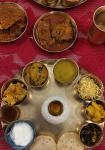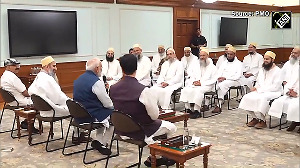Surjit Singh Kalsi has been praying at home and the Surrey gurdwara the whole of last week, as he has done for the last 20 years.
Kalsi, the secretary of the gurdwara, has been praying that the soul of his cousin, killed in the Air India Kanishka explosion would continue to have peace.
He also prayed that the two men facing judgment in a Vancouver court will be punished for plotting and abetting the worst mass murder in Canadian history, in which at least 80 of the 331 victims, including two bag handlers in Tokyo's Narita Airport, were children aged under 12 years.
He had been waiting for the moment, he said, when he could look into the faces of the two men charged with planning the explosions and mutter: "You will endlessly rot in hell."
But when he came out of the courtroom after the judgment was passed, he was instead left wondering if he should believe in God at all.
"I don't feel like going to my gurdwara or any gurdwara for that matter," he said. "I ask God, 'How can we trust you?' I ask God, 'How can you let this judge not punish these mass murderers?'"
"My cousin Indira has been murdered twice, first when these terrorists, who call themselves Sikhs, blew up the plane and then now on Wednesday, when the judge acquitted Ripudaman Singh Malik and Ajai Singh Bagri. I don't know if any good will come out even if the government appeals," said Kalsi.
If the government could not produce credible witnesses when Malik and Bagri were in a prison, he wondered, how could it make its case stronger in an appeal. "If at all there is an appeal," he added.
The government has a month's time to appeal.
But many relatives of the victims in the explosion that killed 329 people, who were aboard Air India's Kanishka, felt that the government, after having spent Canadian $100 million on the investigation and prosecution, might not have the will to go on an appeal.
The judgment has been a severe blow to the prosecution and it might need more than a month to gather its wits, relatives said.
"If witnesses were not ready to speak before the judge when Malik and Bagri were in the prison, will they have the courage to speak out now when Malik and Bagri are celebrating their victories?" wondered a grieving relative in Vancouver who asked not to be identified "I think everyone is demoralised."
"If the government has not been able to produce strong witnesses during the last 20 years," he wondered, "how can it succeed? Will it try for another 20 years?"
"I think a second trial will unnecessarily give hope to some families that justice could be found the second time but I think it is better to close this business down."
Indira Kaur was very close to her cousin, Surjit. Her father Rattan Singh Kalsi said he almost fainted when he heard the verdict. "People were sobbing in the court room," he continued. "I almost ran out, I wanted to breathe some fresh air."
He said he had suffered a nervous breakdown following Indira's death. "And I felt I can't have another nervous breakdown."
"I am not sure if any good will come out of the appeal," he added, "but if a public inquiry is held, much of what the government says is classified will be revealed, and that might lead to something conclusive and good."
Rattan Singh Kalsi who spoke from his nephew Surjit's home said he would return to his home in London, Ontario, about 3000 miles away.
He added: "I am going back home thinking that the so called heroes of Khalistan are still walking around proudly, that among us there are murderers prospering and conspiring, and yet nobody seems to do anything about them."
"But I also tell myself that they have been acquitted by a small court," he said, his voice choking. "I believe there is a far bigger court and is presided over by God. These men cannot escape God's justice."
"God doesn't need to deal with shaky witnesses and judges who cannot see the obvious truth."
"I am telling you these mass murderers will be cursed by our gurus including Nanak Sahib."
If the government spent Canadian $100 million, it was because of its own inefficiency, suggested a few of the embittered relatives. It was not as if the government really wanted to find the guilty ones, they added.
"Had this been a tragedy that affected white, mainstream Anglo-Saxon Canadians, I think the response would have been very different," said Lata Pada, who lost her husband and two children.
Sanjay Lazar whose parents were also killed, said Ottawa had perceived the explosion and loss of lives "as an Indian tragedy, not a Canadian one."
Similar sentiments have been echoed many times during the past 20 years and the government and investigating agencies have consistently denied the allegations saying that the biggest obstacle to the investigation and filing of the charges was the wall of silence in the fractious Sikh community in Canada.
And yet some of the community leaders, including moderate Sikhs like Sarwan Singh Randhawa, who is also the general secretary of Khalsa Diwan Society, said they still retained some hope.
"They have Inderjit Singh Reyat behind the bars for many years and he has confessed to some degree," Randhawa said. "The Royal Canadian Mounted Police are saying they will continue the investigation. So, even now there might be a miracle."
But like Surjit Singh Kalsi, his uncle Rattan and many others who spoke to rediff.com, Randhawa is also worried if the government will try to beef up the existing witnesses and run into the problems as in the just concluded trial.
Judge Ian Bruce Josephson had a lot of trouble with the credibility of the sole witness against Malik, who, apart from various businesses, also ran a credit society and school. The woman, whose name was protected, had testified that she "had a close relationship" with Malik and he had admitted in 1997, when she confronted him with a news report, that he had been deeply involved in the planning and execution of the plan. The woman reportedly had turned against Malik when he called her a slut. But she admitted during the cross examination that she still loved him and respected him.
"That surprise edges toward incredulity," the judge observed. "I am unable to rely on her evidence."
The government had also tried to coax Inderjit Singh Reyat, the only person convicted in the Air India bombing, to reveal crucial information on Malik and Bagri. But Reyat, who has always said he was innocent of the killings, kept dodging the questions and gave confusing answers that led the authorities to brand him a liar. Judge Josephson even called him an "unmitigated liar."
Reyat has said that he has been made a scapegoat because the government wanted to mollify the victims' families.
Reyat, who had already served 10 years for a bombing on June 23 at Tokyo's Narita airport, has also served two of the five-year sentence handed out three years ago for his role in the explosion that killed 329 people on Kanishka off the Irish coast..
"His evidence (in Malik and Bagri's trial) was patently and pathetically fabricated in an attempt to minimize his involvement in his crime to an extreme degree," Josephson said in his ruling. "His hollow expression of remorse must have been a bitter pill for the families of the victims.
"If he harbored even the slightest degree of genuine remorse, he would have been more forthcoming."
When police questioned Reyat soon after the explosion and asked him about abetting militant Talwinder Singh Parmar, he had asserted he did not know anyone with that name.
But when the detectives showed him pictures of being with Parmar, he admitted the latter was his friend. He also said that Parmar had asked him to build an explosive device to be used for "a big job in India." But Reyat said he had no idea Parmar was asking him to build a bomb to blow up an airline.
Parmar, who fled to Pakistan and then arrived in India, was killed reportedly in an encounter with the police in India in 1992. Some accounts have him dying in police custody.
Reyat, who moved to England soon after the explosion and began working as an electrician in a car factory, was extradited to Canada after his three-year fight while in custody against extradition.
His wife and three children too came back to Canada. According to court documents, Malik paid over $50,000 to Reyat's wife Satnam Kaur Reyat. Five years ago, she pleaded guilty to defrauding the government of at least $109,000 in welfare payments.
Several moderate Sikhs in Vancouver said that Reyat and his family is too beholden to Malik that the jailed electrician will not rat on his benefactor and hero.
Could it be also possible that the witnesses, who had something or the other compromising in their past like violation of immigration status, were trying to please the government on one hand, and protect Malik and Bagri on the other hand, wondered some observers.
"If the government will try to change Reyat's mind, I doubt it will succeed," said Surjit Singh Khalsa with a sigh. "And I doubt it will nab other conspirators and witnesses "






 © 2025
© 2025